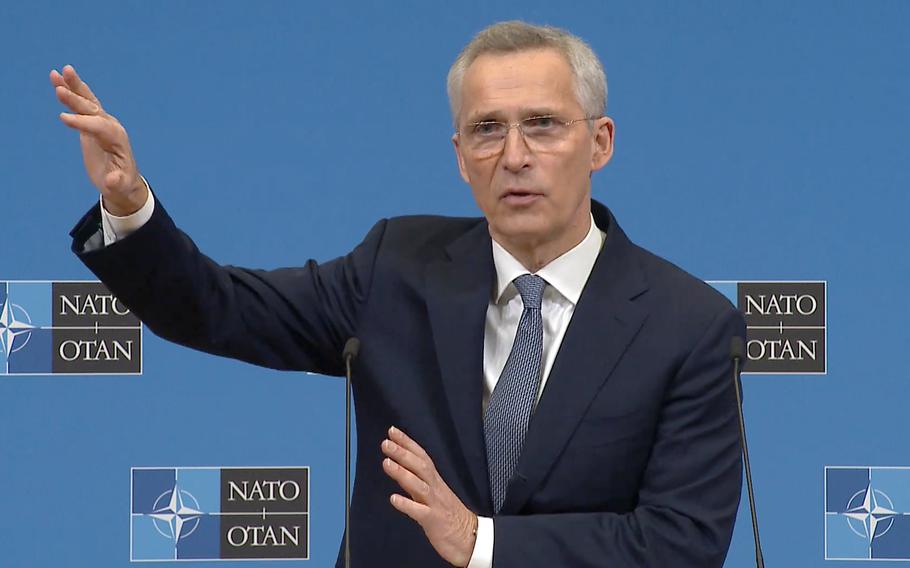
NATO Secretary-General Jens Stoltenberg answers questions in Brussels on Feb. 13, 2023, ahead of a meeting of NATO defense ministers this week at the alliance's headquarters. (NATO)
NATO needs to set more ambitious goals for replenishing ammunition stockpiles as Ukraine burns through reserves faster than allies can refill them, NATO’s top official said Monday.
“The current rate of Ukraine’s ammunition expenditure is many times higher than our current rate of production,” NATO Secretary-General Jens Stoltenberg told reporters ahead of high-level talks in Brussels this week. “This puts our defense industries under strain.”
Stoltenberg, who will host a meeting of NATO defense ministers Tuesday and Wednesday at alliance headquarters, said Ukraine’s enormous consumption of munitions prompted the alliance to carry out an “extraordinary survey” of its inventories.
The message from that review is that allies need to increase their targets for stockpiling ammunition, he said.
“For example, the waiting time for large-caliber ammunition has increased from 12 to 28 months,” Stoltenberg said. “Orders placed today would only be delivered two-and-a-half years later. So we need to ramp up production and invest in our production capacity.”
For the U.S. and other allies, the scale of Russia’s war on Ukraine has put a spotlight on shortcomings in the defense industry when it comes to ramping up large-scale production on short notice.
A key will be getting allies to secure long-term contracts that will enable industry to increase production capacity, Stoltenberg said.
“The good news is that several allies, including the United States and France, have already signed new multiyear contracts with the defense industry,” Stoltenberg said.
But he added that more progress is needed.
During talks in Brussels, U.S. Defense Secretary Lloyd Austin also will convene a meeting of the Ukraine Contact Group, a collection of allies and partners focused on ways to increase military support for Ukraine.
As the war approaches its one-year mark, Russian President Vladimir Putin has given no indication that he is looking for an off-ramp, Stoltenberg said.
“He is launching new offensives, so we must continue to provide Ukraine with what it needs to win and to achieve a just and sustainable peace,” Stoltenberg said.
The NATO chief described the war now as a “race of logistics” involving supplies like ammunition, fuel and spare parts that must reach Ukraine before Russia can seize the initiative on the battlefield.
“Speed will save lives,” he said.
The U.S. and other allies have steadily expanded the array of weaponry they are sending Ukraine. Modern battle tanks and Patriot air defense missiles are among the items soon expected to arrive, after Ukrainian troops complete training on the systems.
In Brussels, the defense ministers likely will grapple with the question of whether to send fighter planes to Ukraine. Some members, such as Germany, have been opposed to the idea, which Berlin regards as escalatory.
Other allies, such as Poland and the Baltic states, have been warmer to the idea.
President Joe Biden, however, has said he has no plans to send U.S. fighter aircraft to Ukraine for now.